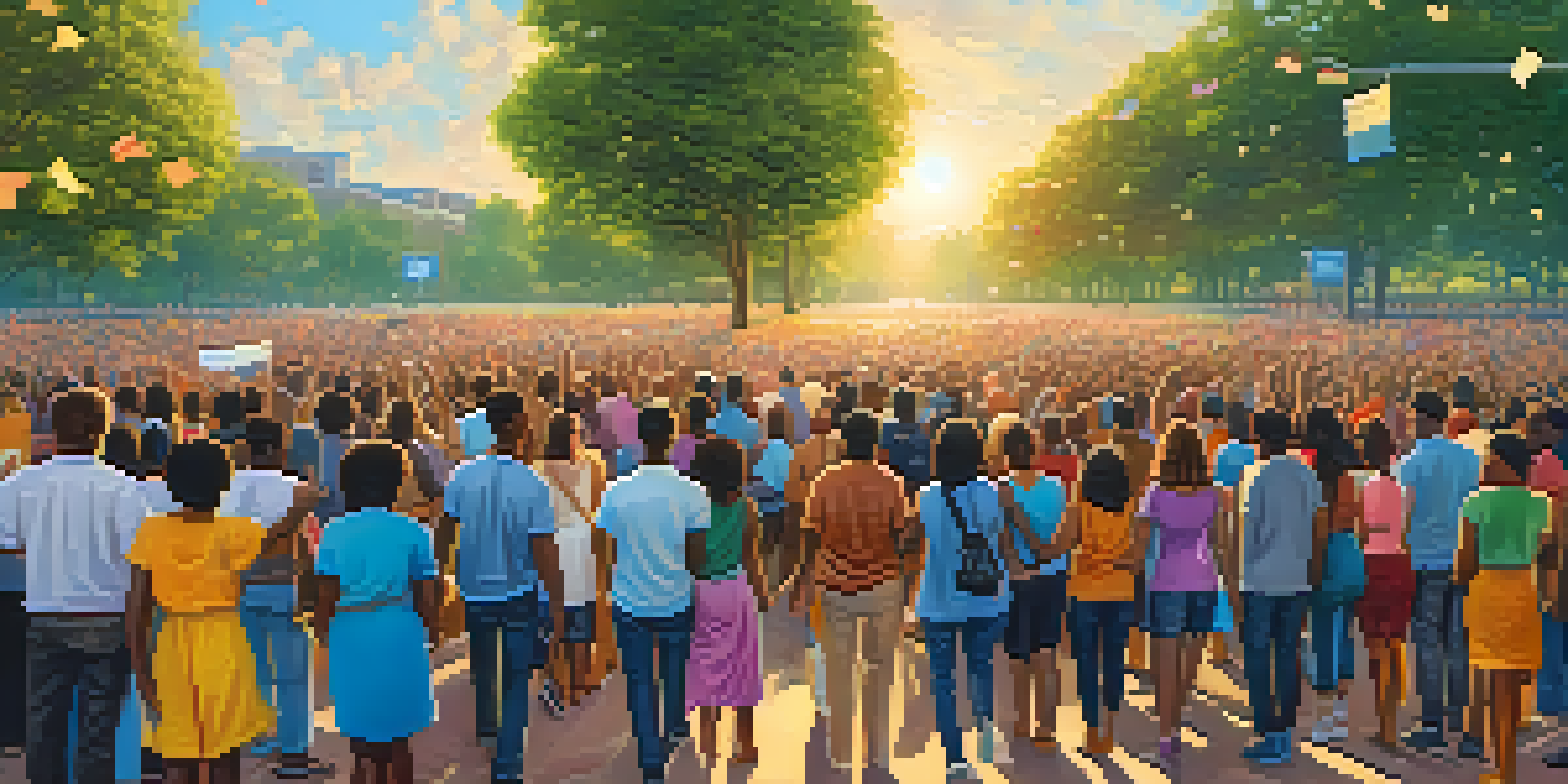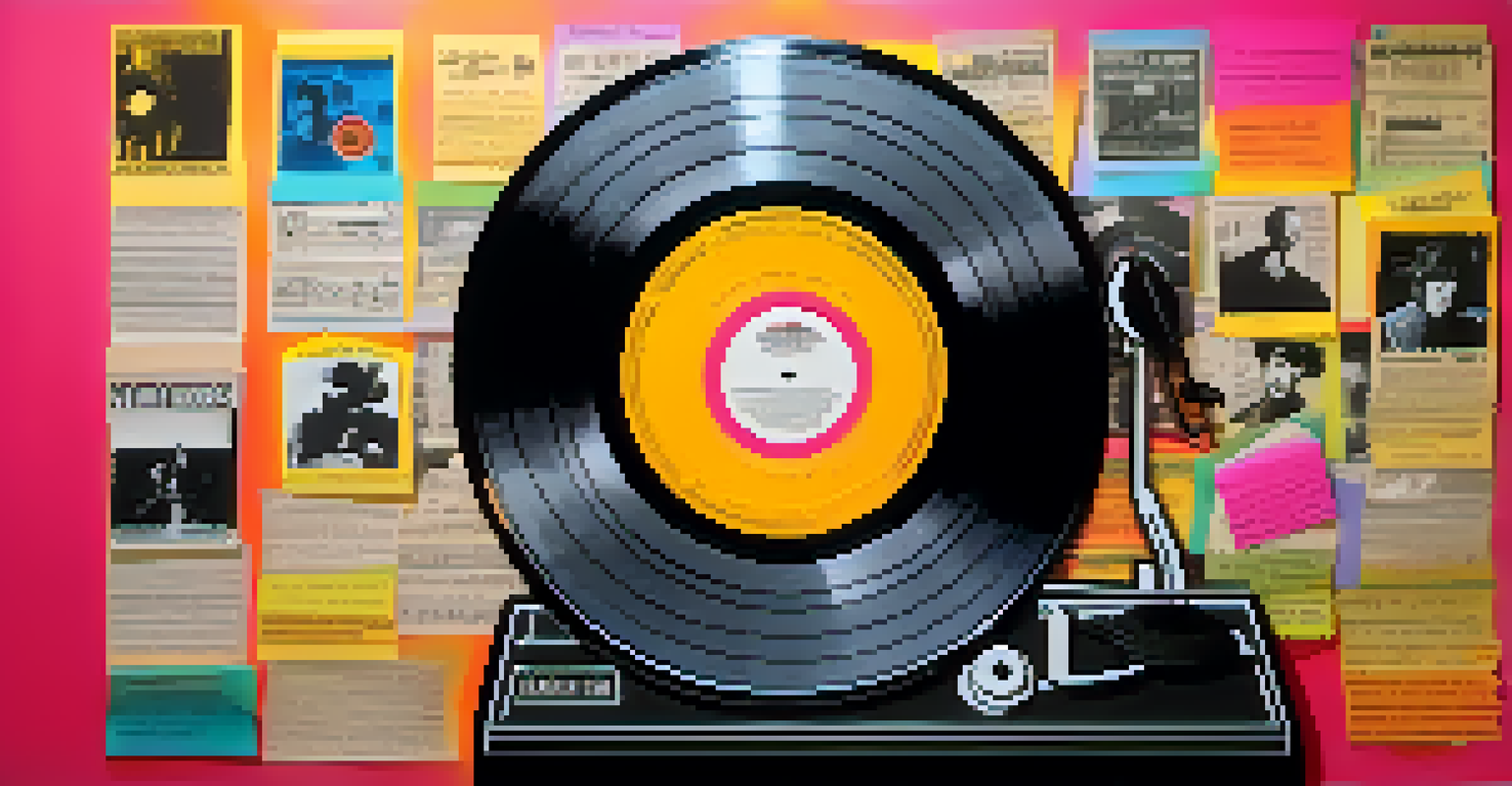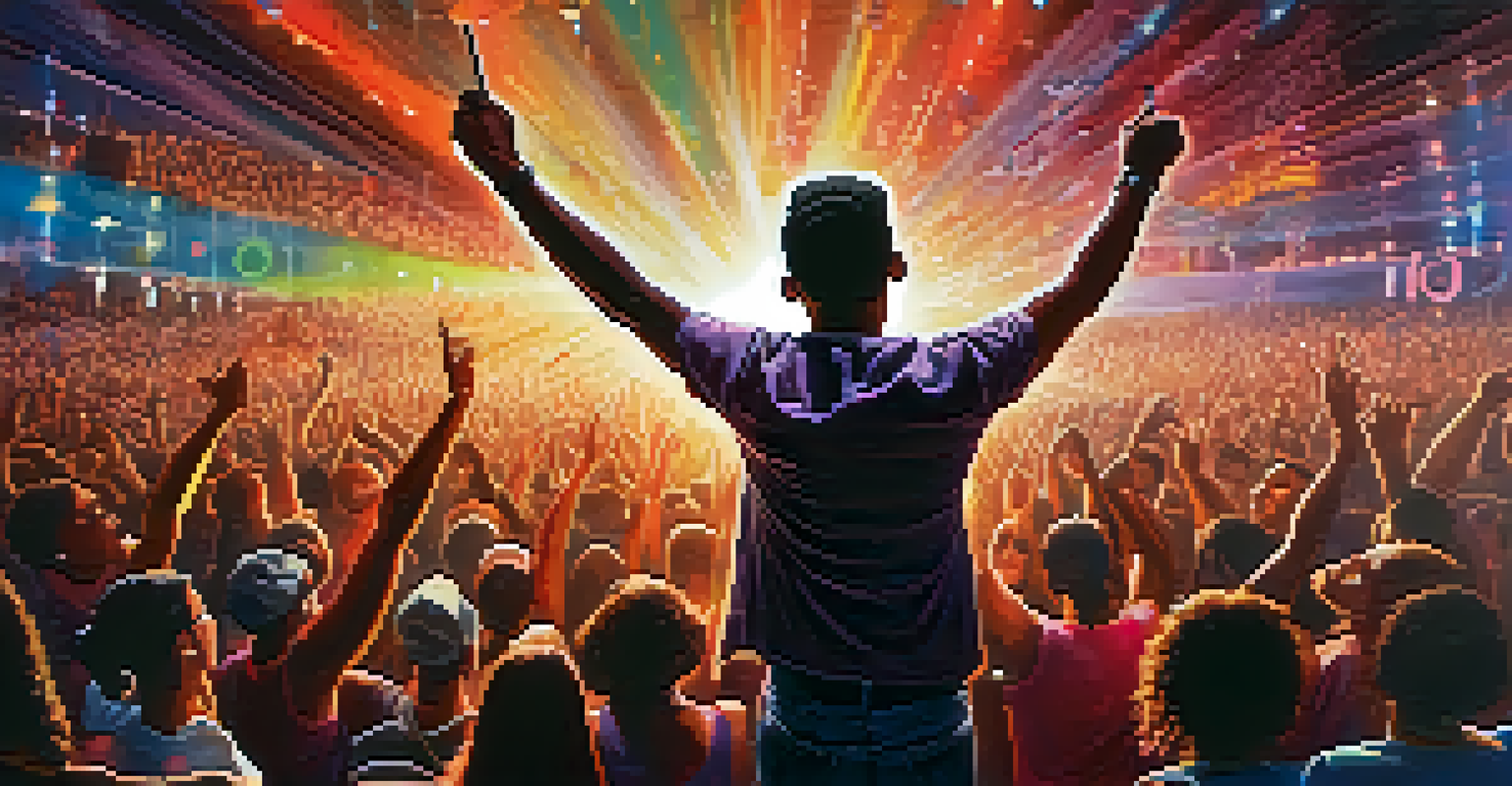Songs of Protest: Music's Influence on Social Justice Movements

The Role of Music in Social Change
Music has always been a powerful tool for expressing collective feelings, and its role in social change is undeniable. From the civil rights movement to the fight against apartheid, songs have served as rallying cries that unite people. These melodies not only inspire but also articulate the struggles and aspirations of those fighting for justice.
Music can change the world because it can change people.
Take, for example, 'We Shall Overcome,' a song that became synonymous with the civil rights movement. It provided hope and a sense of community, encouraging individuals to keep pushing for equality. Music often transcends language barriers, allowing diverse groups to connect over shared ideals, making it a vital component of social movements.
In essence, music acts as a universal language that resonates with human emotions, making it an ideal medium for social protest. It captures the essence of a struggle, reminding us of our shared humanity while motivating action toward change.
Iconic Protest Songs That Shaped History
Throughout history, certain songs have emerged as iconic anthems for social justice. Think of Bob Dylan's 'The Times They Are a-Changin''—a call to action during the 1960s counterculture. Songs like this encapsulate the urgency of societal change, encouraging listeners to join the fight for a better future.

Similarly, Billie Holiday's 'Strange Fruit' tackled the harrowing issue of racism and lynching in America. Its poignant lyrics and haunting melody brought attention to the grim realities faced by African Americans, making it an unforgettable piece of protest music. These songs not only document historical struggles but also inspire future generations to continue the fight.
Music Fuels Social Movements
Throughout history, music has served as a rallying cry for social change, uniting people and articulating their struggles.
The impact of these tracks often extends beyond their initial release, becoming timeless symbols of resistance. They remind us that music can be a powerful catalyst for change, resonating with not just the present but also the future.
The Evolution of Protest Music Over Decades
Protest music has evolved significantly over the decades, reflecting the changing social landscape. In the 1960s and 70s, folk and rock dominated the scene, with artists like Joan Baez and Crosby, Stills, Nash & Young using their platforms for activism. This era solidified the connection between music and social movements, highlighting the power of lyrics to ignite passion and inspire action.
The power of music makes all the difference in the world.
As we moved into the 1980s and 90s, genres like hip-hop began to rise, offering a new voice for marginalized communities. Artists like Public Enemy and N.W.A addressed systemic racism and police brutality head-on, using their music as a form of resistance. This shift showcased how different musical styles could convey urgent social messages.
Today, the landscape is more diverse than ever, with genres like pop, punk, and even electronic music contributing to the dialogue. Artists such as Hozier and Beyoncé continue this tradition, ensuring that protest music remains vibrant and relevant in today's socio-political climate.
The Power of Lyrics in Social Movements
Lyrics play a pivotal role in protest music, as they encapsulate the emotions and experiences of those affected by social injustices. A well-crafted lyric can evoke empathy, provoke thought, and inspire action. For instance, in her song 'Formation,' Beyoncé addresses issues of identity and empowerment within the Black community, using her platform to spark conversations around race and feminism.
Moreover, lyrics often serve as historical documents, preserving the sentiments of the time. They capture the struggles and triumphs of movements, allowing future generations to understand the fight for justice. For example, songs like 'Fight the Power' by Public Enemy resonate with the ongoing fight against systemic racism, proving that powerful lyrics can echo through time.
Protest Songs Evolve with Time
The genres and styles of protest music have shifted over decades, reflecting contemporary social issues and resonating with new generations.
Ultimately, the beauty of protest music lies in its ability to communicate complex ideas in a relatable way. Through catchy hooks and memorable verses, these songs reach audiences far beyond traditional activist circles, encouraging widespread engagement with pressing social issues.
Modern Artists Continuing the Tradition
Today's musicians are continuing the legacy of using their art for activism, with many addressing contemporary issues through their work. Artists like Kendrick Lamar and Janelle Monáe are not just entertainers; they're storytellers who tackle topics like systemic racism and equality in their music. Their ability to weave personal narratives with broader societal issues creates a powerful connection with their audience.
For instance, Kendrick Lamar's song 'Alright' became an anthem for the Black Lives Matter movement, encapsulating hope amidst despair. The phrase 'We gon' be alright' resonated deeply with those fighting for justice, proving that music can uplift spirits even in the darkest times. This demonstrates how modern protest music continues to evolve while still drawing from its rich history.
By embracing their platforms, these artists ensure that the spirit of protest music remains relevant. Their contributions not only inspire their peers but also encourage listeners to engage with social issues, fostering a culture of activism through music.
The Role of Social Media in Music Activism
In the digital age, social media has revolutionized the way protest music is shared and consumed. Platforms like Twitter, Instagram, and TikTok allow artists to connect directly with their audience, spreading their messages far and wide. This accessibility has made it easier for protest songs to go viral, amplifying their impact and reach.
For example, songs like 'This Is America' by Childish Gambino gained immense traction online, sparking discussions about gun violence and systemic racism. The visual elements, combined with the powerful lyrics, created a cultural moment that resonated with millions. Social media enables these messages to transcend geographical boundaries, allowing global conversations about social justice to flourish.
Social Media Amplifies Music Activism
In the digital age, platforms like social media have transformed how protest music is shared, allowing artists to connect directly with audiences and amplify their messages.
Ultimately, the intersection of music and social media has created a dynamic platform for activism. Artists can rally support, share their stories, and mobilize movements in real-time, proving that music remains a vital force for change in today's society.
The Lasting Impact of Protest Music on Society
The lasting impact of protest music on society can be seen in its ability to shape public opinion and inspire change. Songs often become the soundtrack to movements, influencing how people perceive social issues. When a particular song resonates with a cause, it can galvanize support and foster a sense of community among advocates.
For instance, during the Women's March in 2017, songs like 'Respect' by Aretha Franklin and 'Run the World (Girls)' by Beyoncé filled the air, empowering attendees and reinforcing the message of equality. These anthems not only uplifted spirits but also united individuals under a common goal, showcasing the unifying power of music.

As we reflect on the role of protest music, it's clear that its influence extends beyond mere entertainment. It serves as a reminder of the ongoing struggle for justice and equality, encouraging each of us to use our voices in the fight for a better world.